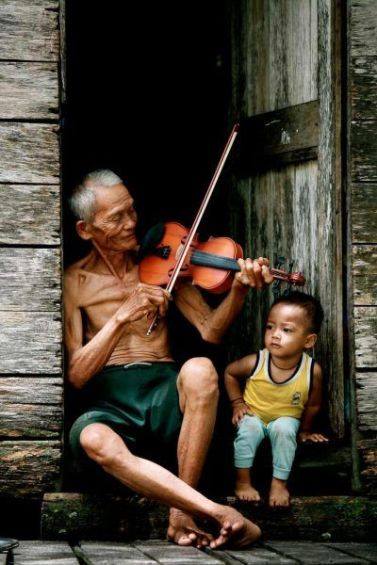Finding Angels in Boulders and Divinity in Geodes

The story is told of an encounter involving the sculptor Michelangelo and one of his neighbors. According to legend, one day Michelangelo was pushing a boulder up the hill to his house. A neighbor observing the scene became quite curious and was overcome with curiosity when the sculptor took out his hammer and chisel, and then began pounding on the boulder. He crossed the street and inquired, “What are you doing hammering on that boulder?” To which Michelangelo replied, “There’s an angel inside and I’m trying to let it out.”
Progressive Christianity asserts that God is present in each one of us. God is not far off but moves within each of our lives, providing energy and possibility; God’s presence in us and not imperfection is our deepest nature. In contrast to sin-based theologies, accenting original sin and human depravity, progressive Christianity affirms original blessing and the inherent divinity of each creature. We are not essentially evil and self-interested, despite the realities of personal and social imperfection and our basic survival instincts. In the spirit of Mother Teresa, we can affirm that Christ is present beneath the often-distressing disguises we see in others and ourselves. We can deny the holiness of others and ourselves, but within each boulder there is an angel, ready to come out when we reach out in care and affirmation.
Compassion is a matter of vision and affirmation. Practices of compassion involve pausing to go beyond alienation and judgment to see the beauty of ourselves and others. Going beyond our knee jerk judgments, we take time to see more deeply into life. Yes, there are boulders and their jagged edges can be painful to us and others. But, beneath the jagged edges is the light of God ready to shine through. This is surely the inner light, the image of God, about which Jesus speaks in the Prologue to John’s Gospel: “the true light, which enlightens everyone, was coming into the world.” (John 1:9)
I often use a geode to illustrate our deepest nature and the call to compassion. At first glance, a geode looks like an ordinary rock, but look inside and it’s a thing of beauty. It’s a matter of pausing, noticing, breathing deeply, and seeing deeply to find the holiness in us and others. (For more on the practice of compassion, see Frank Rogers, Practicing Compassion, Upper Room Books, 2014.)
The compassion of Jesus is grounded in recognizing that as we do unto the least of these, we do unto God. God loves us and seeks our well-being and wholeness and those who follow the Jesus way look for divine in every creature, even those with whom we disagree. Such vision enables to go beyond polarization and find common cause with persons of all backgrounds, ethnicities, perspectives, and lifestyles. I believe that Jesus would have affirmed words from a Buddhist teacher that have shaped my own life, inspiring me to look deeper to discover angels in boulders and divinity in geodes. Thich Nhat Hanh invites us to recognize we are joined and united in the great and graceful of interdependence of life, inspiring us to call each other by our true names and gain a heart of compassion.
Do not say that I’ll depart tomorrow
because even today I still arrive.
Look deeply: I arrive in every second
to be a bud on a spring branch,
to be a tiny bird, with wings still fragile,
learning to sing in my new nest,
to be a caterpillar in the heart of a flower,
to be a jewel hiding itself in a stone.
I still arrive, in order to laugh and to cry,
in order to fear and to hope.
The rhythm of my heart is the birth and
death of all that are alive.
I am the mayfly metamorphosing on the surface of the river,
and I am the bird which, when spring comes, arrives in time
to eat the mayfly.
I am the frog swimming happily in the clear pond,
and I am also the grass-snake who, approaching in silence,
feeds itself on the frog.
I am the child in Uganda, all skin and bones,
my legs as thin as bamboo sticks,
and I am the arms merchant, selling deadly weapons to
Uganda.
I am the twelve-year-old girl, refugee on a small boat,
who throws herself into the ocean after being raped by a sea
pirate,
and I am the pirate, my heart not yet capable of seeing and
loving.
I am a member of the politburo, with plenty of power in my
hands,
and I am the man who has to pay his “debt of blood” to, my
people,
dying slowly in a forced labor camp.
My joy is like spring, so warm it makes flowers bloom in all
walks of life.
My pain if like a river of tears, so full it fills the four oceans.
Please call me by my true names,
so I can hear all my cries and laughs at once,
so I can see that my joy and pain are one.
Please call me by my true names,
so I can wake up,
and so the door of my heart can be left open,
the door of compassion.
In the spirit of Jesus and our Buddhist companions, let us pause, breathe deeply, open to God’s movements in our lives, and look for the holiness. Then we will experience a heart of compassion, joining us with all creation.
Bruce Epperly is pastor of South Congregational Church, United Church of Christ, Centerville, Massachusetts, and the author of over thirty books, including “Process Theology: Embracing Adventure with God,” “Process Theology: A Guide for the Perplexed,” “Healing Marks: Healing and Spirituality in Mark’s Gospel”; and “Finding God in Suffering; A Journey with Job.” He may be reached at drbruceepperly@aol.com.
